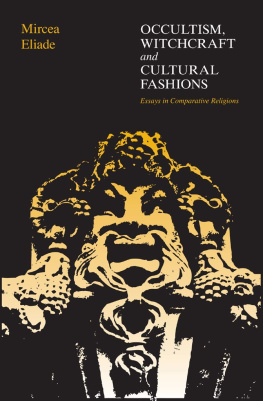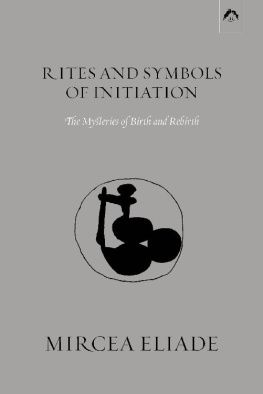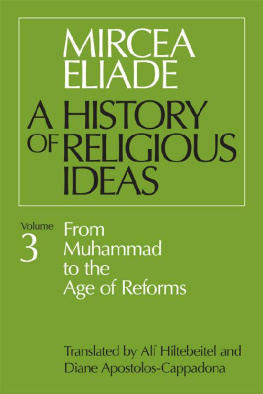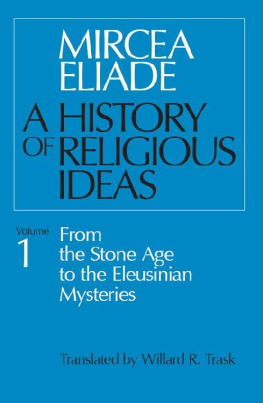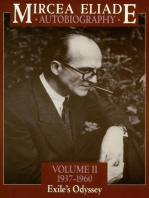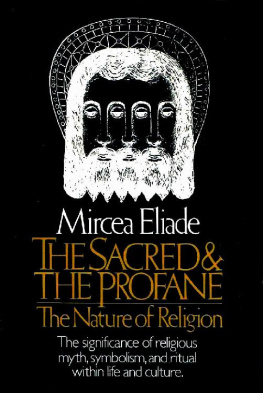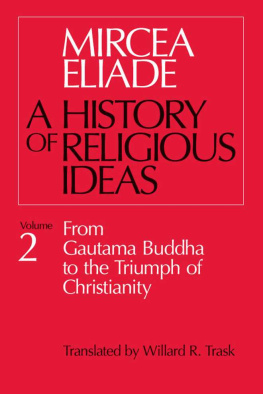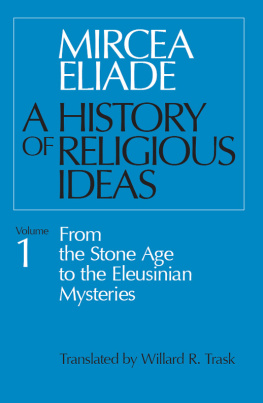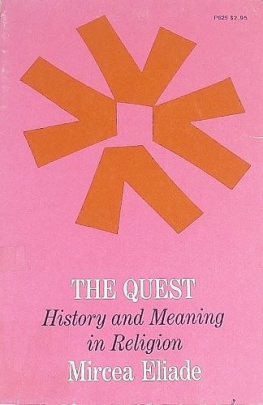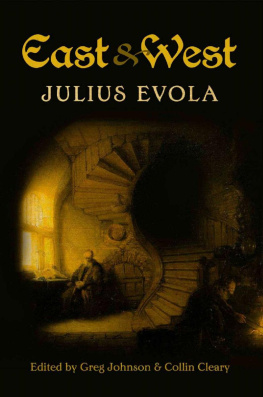Mircea Eliade - Occultism, Witchcraft, and Cultural Fashions: Essays in Comparative Religion
Here you can read online Mircea Eliade - Occultism, Witchcraft, and Cultural Fashions: Essays in Comparative Religion full text of the book (entire story) in english for free. Download pdf and epub, get meaning, cover and reviews about this ebook. year: 0, genre: Science. Description of the work, (preface) as well as reviews are available. Best literature library LitArk.com created for fans of good reading and offers a wide selection of genres:
Romance novel
Science fiction
Adventure
Detective
Science
History
Home and family
Prose
Art
Politics
Computer
Non-fiction
Religion
Business
Children
Humor
Choose a favorite category and find really read worthwhile books. Enjoy immersion in the world of imagination, feel the emotions of the characters or learn something new for yourself, make an fascinating discovery.
- Book:Occultism, Witchcraft, and Cultural Fashions: Essays in Comparative Religion
- Author:
- Genre:
- Year:0
- Rating:4 / 5
- Favourites:Add to favourites
- Your mark:
- 80
- 1
- 2
- 3
- 4
- 5
Occultism, Witchcraft, and Cultural Fashions: Essays in Comparative Religion: summary, description and annotation
We offer to read an annotation, description, summary or preface (depends on what the author of the book "Occultism, Witchcraft, and Cultural Fashions: Essays in Comparative Religion" wrote himself). If you haven't found the necessary information about the book — write in the comments, we will try to find it.
Occultism, Witchcraft, and Cultural Fashions: Essays in Comparative Religion — read online for free the complete book (whole text) full work
Below is the text of the book, divided by pages. System saving the place of the last page read, allows you to conveniently read the book "Occultism, Witchcraft, and Cultural Fashions: Essays in Comparative Religion" online for free, without having to search again every time where you left off. Put a bookmark, and you can go to the page where you finished reading at any time.
Font size:
Interval:
Bookmark:
The University of Chicago Press, Chicago, 60637
The University of Chicago Press, Ltd., London
1976 by The University of Chicago
All rights reserved. Published 1976
Paperback edition 1978
Printed in the United States of America
01 00 99 98 97 96 95 8 9 10 11
ISBN 978-0-226-16330-7 (e-book)
Library of Congress Cataloging in Publication Data
Eliade, Mircea, 1907
Occultism, witchcraft, and cultural fashions.
Bibliography: p.
Includes index.
1. Religions History. 2. Occult sciences. I. Title.
BL80.2.E43 291
75-12230
ISBN 0-226-20392-1 (paperback)
OCCULTISM, WITCHCRAFT, and CULTURAL FASHIONS
Essays in Comparative Religions
Mircea Eliade
The University of Chicago Press
Chicago and London
To Giuseppe Tucci
In memory of our discussions in Calcutta, 19291931
Contents
Preface
At a certain moment in his old age, a prolific author is bound to discover that many of his most cherished projected books remain unwritten. I do not know how others react to such a disquieting discovery, but, speaking for myself, it was with a melancholic resignation that I decided to abandon a number of works that were drafted and partially written over the past twenty-five years. As usually happens, however, I have from time to time made use of these notes and materials in the preparation of public lectures, addresses, and journal articles. Of course, such occasional essays do not sum up the results of long years of research, nor do they always present the many aspects of the topic under consideration in a consistent fashion. But they do have the advantage that, having been prepared for audiences largely composed of nonspecialists, they are accessible to any intelligent reader. All the risks involved in any attempt at popularization notwithstanding, this advantage must not be disregarded. In the last analysis, the scholars only innocent ambition is to be read outside his own community of learning. For many reasons, which I have tried to discuss in some of my earlier publications, this ambition ought particularly to be encouraged among students in the discipline of history of religions.
I have thus selected the materials included in the present volume from several dozen lectures and articles written over the past ten years. All of them are, directly or indirectly, related to projected major works. Most of these essays have an introductory character; ), all the pieces collected in this volume were originally delivered as lectures. I have not tried to change their oral style but have added notes and occasionally a few paragraphs by way of amplification.
Obviously, the last chaptercontrasts somewhat with the rest of the essays. It was written for a learned journal, displays numerous documents from some less familiar cultures, and supplies copious bibliography in the notes. But such external (one is tempted to say: typographical) features should not delude the reader: this text does not pretend to be ranked among the products of pure erudition. The proliferation of quotations and critical references simply serves to acquaint the reader with some of the innumerable expressions of an archaic and widely diffused theologomenon, namely, the equation of the divine and spiritual mode of being with the experience of Pure Light and the equation of the divine creativity with a seminal iridescence. The subject is most fascinating, and it also has considerable importance for the problem of universals (or: invariables) in the history of religious experience. Indeed, the equation Spirit = Light = divine (spiritual) creativity, when considered together with the morphology of luminous theophanies and experiences of inner light, enables the historian of religions to identify a universal no less significant than the now well-known mysterium tremendum.
I am happy to thank my former students who have corrected and stylistically improved these texts: Professors Nancy Falk (. These pages, like my entire work of the past twenty-five years, could not have been written without the inspiring presence and uninterrupted support of my wife. But... Whereof one cannot speak, thereof one must be silent.
Mircea Eliade
University of Chicago
Cultural Fashions and History of Religions
The Artists Unsuspected Mythologies
The question that I should like to discuss in this paper is the following: what does a historian of religions have to say about his contemporary milieu? In what sense can he contribute to the understanding of its literary or philosophical movements, its recent and significant artistic orientations? Or even more, what has he to say, as a historian of religions, in regard to such manifestations of the Zeitgeist as its philosophical and literary vogues, its so-called cultural fashions? It seems to me that, at least in some instances, his special training should enable him to decipher meanings and intentions less manifest to others. I am not referring to those cases in which the religious context or implications of a work are more or less evident, as, for example, Chagalls paintings with their enormous eye of God, their angels, severed heads, and bodies flying upside downand his omnipresent ass, that messianic animal par excellence. Or Ionescos recent play, Le Roi se meurt, which cannot be fully understood if one does not know the Tibetan Book of the Dead and the Upanishads. (And I can testify to the fact that Ionesco did read these texts; but the important thing for us to determine is what he accepted and what he ignored or rejected. Thus it is not a question of searching for sources, but a more exciting endeavor: to examine the renewal of Ionescos imaginary creative universe through his encounter with exotic and traditional religious universes.)
But there are instances when only a historian of religions can discover some secret significance of a cultural creation, whether ancient or contemporary. For example, only a historian of religions is likely to perceive that there is a surprising structural analogy between James Joyces Ulysses and certain Australian myths of the totemic-hero type. And just as the endless wanderings and fortuitous meetings of the Australian cultural heroes seem monotonous to those who are familiar with Polynesian, Indo-European, or North American mythologies, so the wanderings of Leopold Bloom in Ulysses appear monotonous to an admirer of Balzac or Tolstoi. But the historian of religions knows that the tedious wanderings and performances of the mythical ancestors reveal to the Australian a magnificent history in which he is existentially involved, and the same thing can be said of the apparently tedious and banal journey of Leopold Bloom in his native city. Again, only the historian of religions is likely to catch the very striking similarities between the Australian and Platonic theories of reincarnation and anamnesis. For Plato, learning is recollecting. Physical objects help the soul withdraw into itself and, through a sort of going back, to rediscover and repossess the original knowledge that it possessed in its extraterrestrial condition. Now, the Australian novice discovers, through his initiation, that he has already been here, in the mythical time; he was here in the form of the mythical ancestor. Through initiation he again learns to do those things which he did at the beginning, when he appeared for the first time in the form of a mythical being.
It would be useless to accumulate more examples. I will only add that the historian of religions is able to contribute to the understanding of writers as different as Jules Verne and Grard de Nerval,
My purpose here is more modest. I will try to see whether a historian of religions can decipher some hidden meanings in our so-called cultural fashions, taking as examples three recent vogues, all of which originated in Paris but are already spreading throughout western Europe and even the United States. Now, as we all know well, for a particular theory or philosophy to become popular, to be la mode,
Next pageFont size:
Interval:
Bookmark:
Similar books «Occultism, Witchcraft, and Cultural Fashions: Essays in Comparative Religion»
Look at similar books to Occultism, Witchcraft, and Cultural Fashions: Essays in Comparative Religion. We have selected literature similar in name and meaning in the hope of providing readers with more options to find new, interesting, not yet read works.
Discussion, reviews of the book Occultism, Witchcraft, and Cultural Fashions: Essays in Comparative Religion and just readers' own opinions. Leave your comments, write what you think about the work, its meaning or the main characters. Specify what exactly you liked and what you didn't like, and why you think so.

